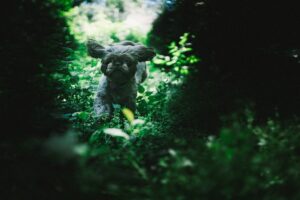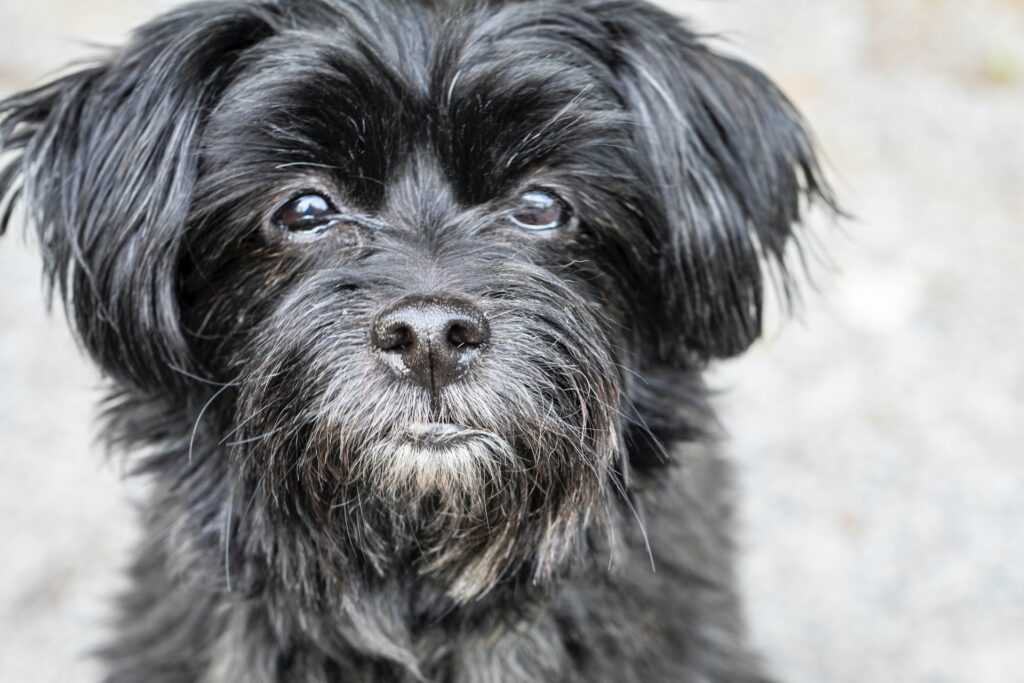A curious gaze and impish charm make the Affenpinscher, often known as the ‘Monkey Dog,’ an irresistible companion. Compact but bursting with personality, these dogs make their presence known and hearts loved. This deep dive will introduce you to the Affenpinscher’s intriguing world, discussing their origins, characteristics, and quirks.
Table of Contents
About Affenpinscher
The Affenpinscher is a tiny package bursting with charisma. Weighing merely 7 to 10 pounds, they stand around 9 to 12 inches tall, perfectly embodying the phrase “small but mighty”. Their thick, wiry coat, usually black but occasionally grey, silver, or tan, creates an unkempt but charming appearance.

They possess expressive eyes, a bushy tail that curves gracefully over their back, and a distinctive, endearing face which has earned them the moniker “monkey dog.” While compact, they radiate an energetic and confident demeanor that captivates hearts and minds.
History
Tracing back to the 17th century, the Affenpinscher’s origins lie in Germany, where they were first bred to function as ratters, keeping homes and stables free of pests. Their small size and agility made them perfect for this role. However, their delightful personalities and attractive looks soon captured people’s hearts, transitioning them from the barnyard to the drawing room, adorning laps of the ladies of the house. Despite their popularity in Europe, it wasn’t until the 1930s that they set paw on American soil, quickly making their mark there as well.
Three Little-Known Facts
- Fearless Pint-Sized Warriors: Their past as ratting dogs bequeathed Affenpinschers with a fearless nature. Despite their petite frame, they’re not afraid to stand up to larger dogs or threats, displaying a courage that’s larger than life.
- Hollywood Star: In the late 20th century, the Affenpinscher had a brush with fame. The 1997 film “As Good As It Gets” featured an Affenpinscher, giving the breed a moment in the Hollywood spotlight.
- A Rare Find: Due to their small size and specific breeding requirements, Affenpinschers are considered a rare breed. This rarity makes acquiring an Affenpinscher puppy a momentous occasion that may require patience.
Energy Level
Beneath their small frames, Affenpinschers hide a surprising amount of energy. These lively, active dogs enjoy a good play session and daily walks. However, their energy is more playful curiosity than hyperactivity, making them a great fit for both house and apartment living, provided their exercise needs are met.
Grooming Needs
When it comes to grooming, the Affenpinscher demands a bit of attention to maintain its characteristic scruffy, yet neat appearance. This breed has a double coat – a dense undercoat and a harsh, wiry overcoat. The fur is usually longer and shaggier around the head and shoulders, giving the Affenpinscher its distinctive ‘mane.’
Brushing is an integral part of Affenpinscher care and should ideally be done at least 2-3 times a week using a medium-bristle brush or a hound glove. Regular brushing helps remove dead hair, distribute natural oils, and keep the coat free from matting and tangling. Given the Affenpinscher’s active nature, their coat can occasionally pick up dirt, so brushing also helps keep them clean.
Unlike many other breeds, Affenpinschers are ‘stripped.’ Stripping involves pulling out loose, dead hair from the overcoat, promoting new hair growth and maintaining the coat’s natural texture and color. It’s generally done every few months and can be learned from a professional groomer or a breeder.
Affenpinschers do not need frequent baths – usually only when they’re notably dirty or smelly. Overbathing can strip the coat of natural oils, causing it to become dry and brittle. When you do bathe your Affenpinscher, use a dog-specific shampoo to maintain the pH balance of their skin.
Additionally, grooming isn’t just about the coat. Regular dental hygiene, including teeth brushing and professional cleanings, and nail trims are vital to the Affenpinscher’s overall health. Ears should be checked regularly for signs of infection, irritation, or wax build-up.
Health Concerns
Affenpinschers are generally a robust breed, but they can be prone to some specific health issues. Hip dysplasia, heart anomalies, and eye conditions, including cataracts and glaucoma, are among the few. Regular veterinary visits, preventive care, and a balanced diet can mitigate these risks, ensuring your Affenpinscher enjoys a long, healthy life.
Temperament and Personality
Affenpinschers are spirited and confident, full of zest and love for life. They are deeply loyal, often forming strong bonds with their family members. Their alert and inquisitive nature makes them excellent watchdogs, despite their small size. They’re playful and affectionate but can showcase stubborn streaks. Yet, their charming demeanor and cheeky antics make them irresistible companions.
Child and Pet Friendliness
Affenpinschers are known for their spunky and protective nature. When it comes to children, they generally get along better with older, more considerate kids. Affenpinschers are small and can sometimes be seen as ‘fragile.’ Young children, particularly toddlers, may unintentionally be too rough or clumsy with a small dog, leading to potential injuries. Additionally, these dogs may not tolerate the loud noises and fast movements that often come with smaller kids. Therefore, it’s advisable to supervise interactions between Affenpinschers and young children.
On the flip side, older children who understand how to respect a dog’s space and handle a pet gently can form strong bonds with Affenpinschers. Teaching children how to appropriately pet, play with, and handle dogs can go a long way in ensuring harmonious relationships.
In terms of other pets, Affenpinschers can cohabit quite comfortably with other animals, particularly if they’re raised together. They generally get along well with other dogs, and can also adapt to living with cats. However, due to their background as ratters, they have a strong prey drive. This means they might see smaller animals, like hamsters or birds, as prey. It’s important to consider this if you have or plan to have small pets in your home.
In the end, every Affenpinscher is an individual and their upbringing, socialization, and experiences can heavily influence how they interact with children and other pets.
Trainability
The intelligent and quick-witted Affenpinscher is capable of learning a great deal, but training this breed comes with its own unique set of challenges. While they can be clever, they are equally known for their independent and sometimes stubborn nature, making consistent training a must for any Affenpinscher owner.
The foundation of training an Affenpinscher lies in understanding their temperament. These dogs have a strong personality and are used to getting their way. Therefore, traditional methods of training may not always yield the desired results. Instead, they respond best to training that is made fun and engaging, turning learning into a game that piques their interest. A bored Affenpinscher is less likely to follow instructions, while one that’s entertained will be more inclined to participate.
Positive reinforcement is a key strategy in training Affenpinschers. This means rewarding good behavior with treats, toys, praises, or petting. When they do something right, a reward helps them associate that behavior with positive outcomes, encouraging them to repeat it in the future. It’s important to avoid punishment-based methods, as they can harm your relationship with your Affenpinscher and potentially lead to adverse behaviors.
Patience is another crucial factor in training an Affenpinscher. It might take some time for these dogs to pick up new commands or break old habits, and getting frustrated won’t speed up the process. Instead, consistent repetition and gradual progression will yield better results.
Early socialization and puppy training classes are highly recommended for Affenpinschers. The earlier you expose your Affenpinscher to different people, places, sights, and sounds, the more well-rounded and adaptable they will grow up to be. Puppy training classes provide excellent opportunities for socialization and also teach basic commands, manners, and leash training.
Training an Affenpinscher also extends beyond basic commands. These dogs are agile and active, making them great candidates for dog sports such as agility, obedience, rally, and even tracking. These activities provide mental stimulation, physical exercise, and strengthen the bond between you and your pet.
Finally, it’s crucial to remember that every Affenpinscher is an individual. What works for one might not work for another. Therefore, being adaptable and ready to adjust your training methods to suit your Affenpinscher’s unique needs and preferences can greatly aid in the training process.
Space Needs
Affenpinschers are adaptable and can comfortably live in both houses and apartments. They don’t need a large yard to roam, but they do enjoy having enough space for their toys and play sessions, as well as a safe place to retreat to when they want some peace.
Exercise and Mental Stimulation Needs
Despite their small size, Affenpinschers pack a considerable amount of energy and require regular exercise to keep them healthy and happy. However, their exercise needs are not as demanding as larger, more energetic breeds.
Affenpinschers are content with a couple of short to moderate walks each day, coupled with some playtime. They love playing games, especially ones that involve chasing toys or playing tug-of-war. Even though they might not need long hikes, they would still enjoy the occasional adventure, providing them with new scents to investigate and sights to see.
In terms of mental stimulation, this is an area where the Affenpinscher’s needs are often underestimated. These dogs are intelligent and curious, traits which helped them in their historical role as ratters. To cater to their active minds, a variety of engaging activities should be provided.
Puzzle toys are an excellent way to challenge an Affenpinscher’s intellect. These toys, which often involve the dog figuring out how to get to a treat or toy hidden inside, can provide hours of focused play. Rotating toys can also keep things interesting, preventing boredom from setting in.
Training sessions also serve as mental stimulation. Teaching your Affenpinscher new tricks or commands not only enhances their obedience but also keeps their mind sharp. Remember to keep these sessions fun and positive to hold their interest.
Enrolling your Affenpinscher in dog sports, such as agility or obedience, can provide both physical exercise and mental stimulation. These activities can help improve their coordination, concentration, and problem-solving abilities.
Remember, while physical exercise is essential, mental stimulation is equally important for a breed as intelligent as the Affenpinscher. A well-exercised and mentally satisfied Affenpinscher is a happy and well-behaved companion. Therefore, providing a balance of physical activities and mental challenges is crucial to meet their overall exercise and stimulation needs.
Lifespan
Affenpinschers are blessed with a relatively long lifespan for a dog. On average, they live between 12 to 15 years, though some can reach even older ages with good care and a healthy lifestyle.
Breed-Specific Quirks
While each Affenpinscher is an individual, there are a few breed-specific quirks you might encounter. These include a strong prey drive, inherited from their ratting days; an entertaining tendency to “monkey around,” due to their curious and playful nature; and a slight stubborn streak, though usually manifested in a charming, rather than problematic, way. Despite these quirks, or perhaps because of them, Affenpinschers bring a unique, joyous flair to their owners’ lives.
In conclusion, with their mix of bravery, intelligence, and a dash of impish charm, Affenpinschers make delightful companions, offering an abundance of love and entertainment in a compact package.


Dennis and Becca, have always shared a passion for man’s best friend. As dog enthusiasts, they put together articles that inform, engage, and captivate fellow dog lovers.